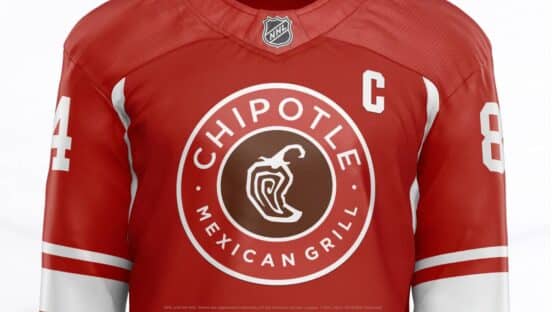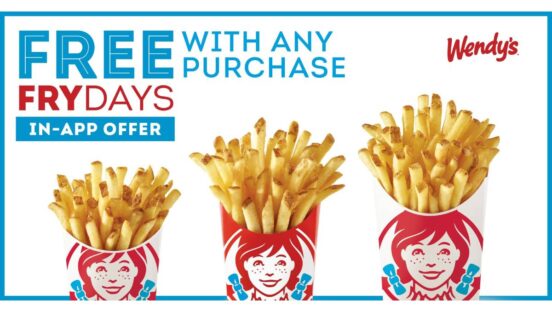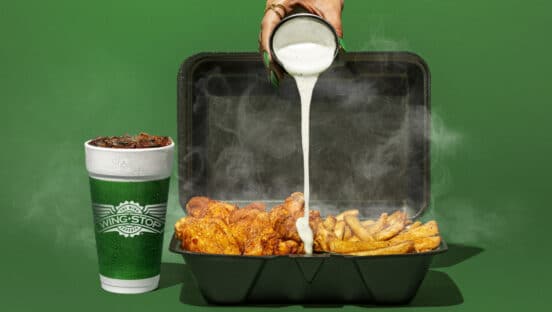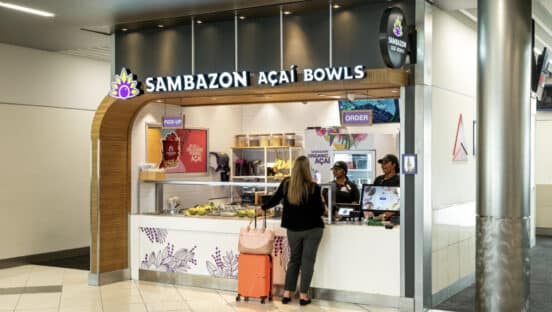Tricon Global Restaurants, Inc. (NYSE:YUM) reports
operating results for the first quarter, ended March 24, 2001, including:
• Ongoing Operating EPS of $0.59
• Total system sales increase of 4% prior to U.S. dollar conversion
• U.S. blended same-store sales even with last year
• A first-quarter record number of international restaurant openings
• Franchise fees of $180 million, up 5%
As expected, reported EPS declined due to planned lower refranchising gains versus last year, which were
previously announced.
Revenues were up 3% for the quarter, excluding the impact of
refranchising, joint-venture formation and acquisitions.
Ongoing operating EPS does not include the impact of facility
actions net gain (loss) or unusual items.
David C. Novak, Chairman and CEO said, “First-quarter earnings, while below a year ago, were in line with our
earlier expectations. Overall, our improving sales trends continue to support our expectations for full-year ongoing
operating EPS of at least $3.18.
“Going into the year, our No. 1 challenge was to improve sales trends at Taco Bell and KFC, and I am encouraged
by progress at both brands. Emil Brolick, at Taco Bell, and Cheryl Bachelder, at KFC, the new presidents at each
company, are beginning to put strong plans in place, and operational execution is improving. Taco Bell, while down
an unacceptable 6% for the quarter, has shown steady improvement in same-store sales. This week, Taco Bell is
launching the new Grilled Stuft Burrito(TM), a major quality upgrade to the menu. KFC was up 2% for the quarter,
on the strength of the successful introduction of a new wings flavor, Spicy Barbecue. More significant product news,
like the recent launch of improved Extra Crispy Chicken, is on the calendar for the balance of 2001. Results at
Pizza Hut continue to be solid with 3% same-store-sales growth. The recent sales success with the launch of
Twisted Crust(TM) pizza shows the power of leading in pizza innovation.
“In summary, we are confident that U.S. blended same-store sales will increase by at least 2% for the full year
2001. The balance of the year, we expect +2% to 3% same-store-sales growth, showing consistent improvement
versus our first-quarter performance. However, like the rest of the industry, Tricon is challenged with managing
energy cost inflation, which was particularly severe in the first quarter. We expect energy costs to continue to show
significant inflation throughout the year. Even with these additional costs and anticipated Taco Bell franchisee
restructuring expenses, our full-year earnings projection remains unchanged.
“During the first quarter, we made progress in all five key areas that we believe are long-term growth drivers and
make us a unique restaurant company:
International expansion continued as we set a record for first-quarter openings, allowing us to raise our
full-year forecast to 930 openings from 850. On the strength of 929 new openings last year, first-quarter system
sales were up 9% in local currency.
U.S.blended same store sales were flat for the quarter but showed steady progress (versus prior trends) at
Taco Bell and positive growth at KFC and Pizza Hut.
Multibranded restaurant growth is on track, with 47 multibranded restaurants added this quarter. We
have recently assigned Tony Mastropaolo, an outstanding operator, to head a new multibranding operational team.
The goal is to develop even better operating systems and consistent execution for our customers.
Franchise fees increased to $180 million, up 5%. Additionally, we made solid progress toward resolving Taco
Bell franchise financial issues.
Cash flow generated—about $150 million in the quarter—is on track to reach over $1 billion for the year. We
expect to maintain our QSR industry-leading return on invested capital of 18% in 2001.”
International Expansion and Business Performance
During the first quarter, 199 new traditional restaurants were opened outside the U.S., setting a record and almost
doubling last year’s opening rate. Significantly, Tricon is opening restaurants at a rate of more than two new
locations each day outside the U.S. For the full year, the company now expects new traditional restaurant openings
outside the U.S. to be at least 930 versus 850 previously forecast.
For the quarter, international system sales increased 9%, before a 7% negative effect of translating foreign
currency into U.S. dollars. During the quarter, Tricon experienced solid local currency growth in these core
countries: China, Japan, Korea, Mexico, and the U.K.
Ongoing operating profit in U.S. dollars was basically flat versus last year as the company had anticipated. The
unfavorable impact of foreign currency translation, refranchising, start-up costs related to accelerated openings of
new restaurants, and acquisitions all offset the benefit from strong system-sales growth. Importantly, new
restaurants typically experience higher expenses during the first 120 days of operation before reaching normal
operating profitability. Additionally, spending on strategic growth initiatives and cost pressures, including utilities,
impacted profit growth.
For the full year, we expect the international business to deliver continued strong system-sales growth prior to
conversion to U.S. dollars. On a comparable 52-week basis, international operating profit is expected to grow at a
mid-teens rate prior to significant impacts from foreign currency translation. This includes significant investment
spending, primarily in the first half of the year, to drive long-term growth initiatives.
U.S. Blended Same-Store Sales and Business Performance
For the first quarter, U.S. blended same-store sales were even with last year. U.S. system sales, however,
increased 1% primarily as a result of the benefit from opening new higher-volume, new-image restaurants and
closing older restaurants with lower volumes and non-prime locations. Pizza Hut continued to produce solid results,
with 3% growth in same-store sales. KFC’s same-store sales increased 2%, the brand’s best quarterly performance
since the fourth quarter of 1999. These results include positive transaction growth for both brands. Taco Bell’s
same-store sales declined by 6% with steady improvement through the quarter. As expected, U.S. ongoing
operating profit declined by 10% primarily as a result of additional expenses related to the financial restructuring of
certain Taco Bell franchise businesses, the dilutive operating-profit impact of refranchising and substantially higher
utility costs.
Multibranded Restaurant Growth
The expansion of our multibranding concepts continued as 47 multibranded restaurants were added in the first
quarter. The company now operates over 1,200 multibranded restaurants globally, making Tricon the world’s
largest multibranded restaurant company. The system includes approximately 700 KFC/Taco Bell restaurants, 400
Taco Bell/Pizza Hut Express restaurants, and over 100 KFC/Pizza Hut Express restaurants. For the full year, Tricon
expects continued rapid expansion of the multibrand concept. The company expects to have approximately 1,600
multibrand restaurants in operation by year’s end.
Franchisee Business Growth
Franchise fees for Tricon’s three global brands totaled $180 million, an increase of 5% versus first quarter last year.
Growth was driven by franchise new-unit expansion and the purchase of company operated restaurants by
franchisees. Tricon expects continued franchise new-restaurant development, which will drive further growth in
global franchise fees to $835 million for the full year 2001.
Cash Flow and Returns
Tricon’s strong cash flow was invested in a number of growth areas, including international and multibranding
expansion, during the first quarter. Additionally, the company continued to invest in the transformation of existing
U.S. assets primarily through remodel and replacement programs at KFC and Pizza Hut. Upgrading assets,
particularly at KFC, is important as we work to continue improving consumer brand ratings.
Historically, the vast majority of the company’s cash generation occurs in the latter three quarters of the year in
correlation to sales seasonality. Therefore, it is notable that the company’s net debt remained flat and the company
was able to initiate a second share repurchase program. Tricon initiated its $300 million share repurchase program
and acquired $10 million of its own shares during the quarter. In 2001, the company expects cash generated will
exceed $1 billion, allowing for about $725 million in capital to be invested in the business, $200 million to reduce
debt and at least $100 million to repurchase shares.
Return on invested capital is expected to remain at 18% for the full year, significantly above Tricon’s cost of capital
and one of the best levels in the restaurant category. Tricon expects continued solid returns on international and
multibranded investments combined with strong franchise business expansion, which requires virtually no capital
investment by Tricon. At the end of the first quarter, nearly 21,000 franchise and joint venture traditional
restaurants were in operation worldwide versus 19,838 in the first quarter of 2000, an increase of 6%.
Financial Progress
Restaurant margin of 14.1% was comparable to last year’s first-quarter results. U.S. restaurant margin was up
slightly from last year as substantially higher utility costs were more than offset by favorable product mix and
pricing. Commodity costs were also favorable. International restaurant margin declined primarily due to operating
cost increases (including higher utility costs), acquisition and new-unit start-up costs.
For the full year, the company expects restaurant margin to be even with last year. Positive U.S. blended
same-store sales for the remainder of 2001 is expected to favorably add to margin performance, offsetting the
impact of expected higher energy and commodity costs. Additionally, in the international business, Tricon will
continue to be impacted by acquisitions and new-restaurant start-up costs as it accelerates international expansion
and executes this key growth strategy.
During 2001, Tricon will continue to invest in a number of customer-focused programs intended to enhance quality
and customer experience and increase overall consumer ratings for each brand. These include quality upgrades at
KFC with improved flavor in Extra Crispy and Original Recipe chicken, the new steak product and grilled burrito at
Taco Bell and systemwide facility upgrades. The company believes these are important investments to further
strengthen its three leading brands and drive sustainable same-store sales going forward.
For 2001, Tricon will continue to aggressively manage structural costs not directly related to the restaurants. As
such, the company is targeting further reductions in interest expense and the ongoing operating tax rate, while
holding overhead costs flat in dollars year over year. With the recent market reductions in interest rates and further
debt reduction, interest expense should decline by approximately 5% from last year’s level. This is based on the
company’s current debt structure, which includes the recent successful bond issue. Tricon continues to pursue key
tax strategies to improve the ongoing operating tax rate, which could result in a slightly lower rate versus the 2000
level.
In the first quarter, Tricon experienced approximately three cents per share of unfavorable impact from the
translation of foreign currencies to U.S. dollars. The Australian dollar, British pound sterling, Canadian dollar,
Japanese yen, Korean won, and Mexican peso are all significant currencies in the results of the company’s
international business. Each of these currencies was weaker versus the U.S. dollar, compared to first quarter of
2000. As previously communicated, Tricon expects a comparable impact in the second quarter of 2001.
Taco Bell Franchise Business
As previously disclosed, certain of the company’s Taco Bell franchise operators are experiencing varying degrees
of financial difficulty with respect to their franchise operations. This was primarily a result of declining restaurant
sales, which were exacerbated by the grocery product recalls of corn taco shells by Kraft in the fourth quarter of
2000.
Taco Bell is in various stages of discussion with a number of Taco Bell franchisees and their lenders, representing
approximately 1,000 Taco Bell franchised restaurants. The company believes that many of these franchisees will
require various types of business and/or financial restructuring, which could include the purchase of some
franchised restaurants by Taco Bell. Taco Bell has been working diligently during the first quarter to resolve these
issues. To date, restructurings have been completed for over 30% of these restaurants. It is anticipated that an
additional 40% to 50% will be completed during the second quarter.
During the first quarter of 2001, Tricon experienced an additional $7 million of expense related to allowances for
doubtful franchise and license-fee receivables. These costs were reported as general and administrative expenses.
Tricon intends to continually evaluate the appropriateness of estimated allowances, and assess the need for any
additional charges related to ongoing fees and other related financial contingencies. In this regard, the company
anticipates that some additional expenses related to this situation may be incurred during the balance of 2001.
The company guidance relative to the Taco Bell franchisee situation remains unchanged. During the second
quarter of 2001, an estimated expense of $5 to $8 million is possible. The possibility of these additional expenses,
along with the financial effects that result from any foreseeable purchases of franchised restaurants by Taco Bell,
have been included in the company’s ongoing operating EPS and cash-flow estimates for the full year.
Ongoing Results(1)
Tricon’s revenues declined in the first quarter of 2001 and are expected to decline slightly for the full year
2001 due to the company’s refranchising program, which should be substantially completed in 2001.
General and administrative expenses increased 5% in the quarter primarily from the inclusion of $7 million of
bad debt expense related to our Taco Bell franchise business.
The effective tax rate on ongoing operating profit for the quarter was 37.3%, which was lower than last year’s
rate of 39.0%. For 2001, we expect the tax rate on ongoing operating profit to be in a range of 37% to 38%.
The tax rate on reported earnings was 35.6% for the quarter, versus 40.1% a year ago.
Depreciation and amortization was $73 million for the quarter.
Capital spending was $143 million for the quarter, including $49 million for acquisitions. For 2001, the
company expects capital spending of $725 million, which includes the purchase of some Taco Bell
restaurants from franchisees.
Average shares outstanding utilized in the diluted EPS calculation declined slightly to 150 million shares from
151 million in Q1 2000. The decline was driven by the impact of the share repurchase program partially
offset by the dilutive impact of a higher average share price in Q1 2001.
(1) These results should be read in conjunction with the attached financial summary.
Tricon Global Restaurants Inc. will hold a conference call to review the company’s operating and financial
performance at 9:00 a.m. EDT on Wednesday, May 2, 2001.






